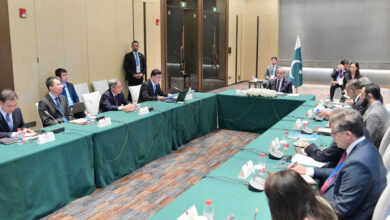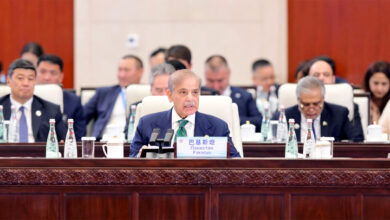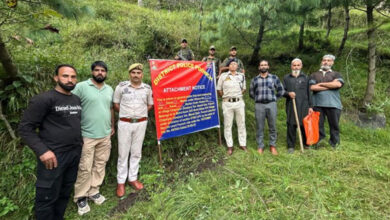سلايدر
Army warns India of ‘stronger response’ against any ‘misadventure’

–ISPR DG says current surge in Indian troop deployment will fail to suppress Kashmiris’ just struggle for freedom
–Says Indian general’s remarks are ‘an attempt to carve out casus belli for a misadventure to divert world attention from Kashmir’
RAWALPINDI: Pakistani military’s chief spokesman Major General Asif Ghafoor Yesterday Friday warned India that “any misadventure” in Kashmir would meet with a “response even stronger than that of Feb 27”.
Ghafoor, the director general of the Inter-Services Public Relations (ISPR), was referring to the airstrike conducted by Pakistan Air Force (PAF) across the Line of Control (LoC) from Pakistani airspace in which it shot down two Indian MIG-21 aircraft that had crossed the de-facto border in a follow-up to the Pulwama incident in occupied Kashmir.
India this week revoked Article 370, which gave occupied Kashmir an autonomous status, and legislated to bifurcate the Valley into Ladakh and Jammu and Kashmir.
In response to New Delhi’s move to annex occupied Kashmir, Pakistan on Wednesday resolved to downgrade diplomatic relations with India and suspend all bilateral trade.
India, however, has termed it an “internal matter” and asked Pakistan to review its decision. Meanwhile, a communications blackout and security clampdown imposed late Sunday in occupied Kashmir entered its fifth day on Friday. By Thursday, Indian security forces had arrested more than 500 people in the region.

In a series of tweets posted late Thursday night, the chief military spokesperson observed that “thousands of Indian troops have failed to suppress just struggle of brave Kashmiris for decades,” adding: “Current surge won’t succeed either.”
In another tweet posted in response to a video of the Indian Chinar Corps Commander, Lieutenant General Kanwal Jeet Singh Dhillon, Ghafoor dismissed as “usual blatant lies” the statement in which the official, while interacting with journalists, had said that India would “take care” of anyone who disrupted peace in occupied Kashmir and alleged that “the Pakistan Army and Pakistan had always been involved in disrupting peace in the Kashmir Valley”.
He dubbed the statement as “an attempt to carve out casus belli for a misadventure to divert world attention from precarious situation & atrocities in IOJ&K [Indian occupied Jammu and Kashmir].”
‘Casus belli’ is a Latin expression meaning “an act or event that provokes or is used to justify war”.
The ISPR DG further added that while Indian occupied Kashmir (IoK) was facing a media blackout, Azad Jammu and Kashmir (AJK) was open to the foreign media and the United Nations Military Observers Group in India and Pakistan (UNMOGIP) could visit “place(s) of their own choosing” in AJK.
“Can you do the same?” he asked Lt Gen Dhillon.
In its response to India’s recent actions in occupied Kashmir, Pakistan on Wednesday ended bilateral trade, downgraded diplomatic ties and, in a rare occurrence, and directed New Delhi to withdraw its High Commissioner Ajay Bisaria from Islamabad.
The decision was made during a high-profile meeting of the National Security Committee (NSC) which was presided over by Prime Minister Imran Khan in Islamabad. This was the second such meeting called by the premier in this week concerning crisis emanating from Kashmir.
The meeting also decided to review the Pakistan-India bilateral arrangements, take the matter to the United Nations and observe the upcoming Independence Day on August 14 in solidarity with Kashmiris.
“PM directed that all diplomatic channels be activated to expose brutal Indian racist regime, design and human rights violations,” a statement issued after the meeting said. The premier also directed the armed forces to continue their vigilance, as per the handout.
The meeting attended by the top civilian and military leadership also decided to recall Pakistan’s ambassador from New Delhi.
Meanwhile, UN Secretary General António Guterres on Thursday called on all parties to refrain from taking steps that could affect the status of Jammu and Kashmir, which is recognised as a disputed territory by the United Nations and the Security Council.
Noting that the secretary general was following the situation with concern, the statement clarified that the UN position on Kashmir was tied to its own charter and applicable Security Council resolutions. He also appealed to both India and Pakistan to show “maximum restraint” while looking for means to resolve this 70-year-old dispute.
Earlier on Thursday, the United States also noted that India’s decision to annex Kashmir could increase instability in the region.





